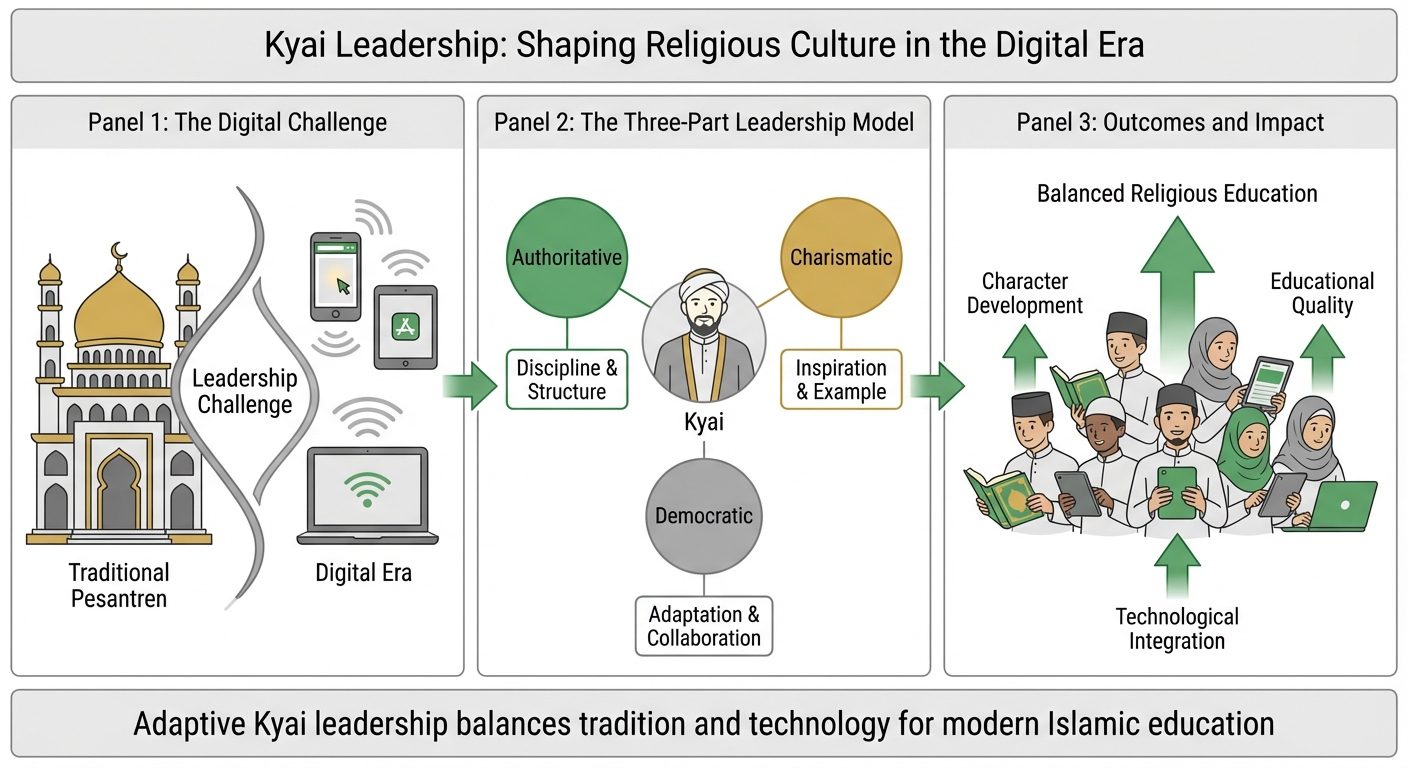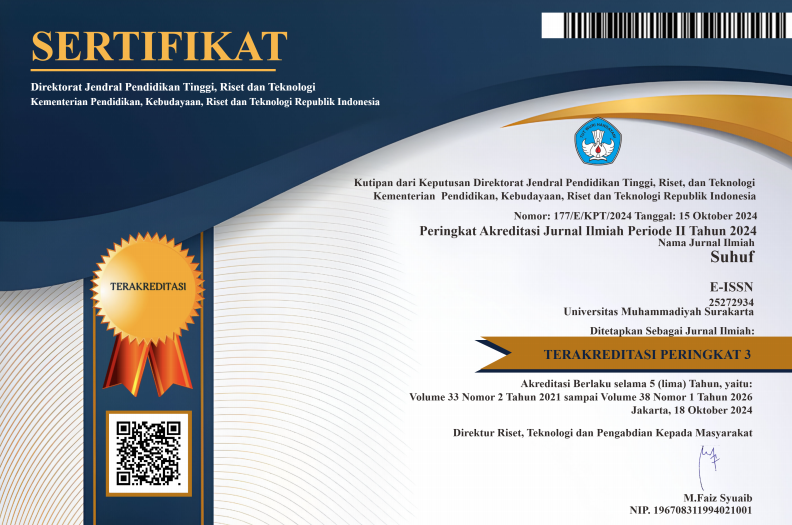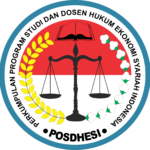How Does Kyai Leadership Navigate the Digital Era in Shaping Religious Culture?
DOI:
https://doi.org/10.23917/suhuf.v37i2.10579Keywords:
Religious culture, Digital era, Islamic education, Islamic Boarding School, LeadershipAbstract
This study aims to describe the implementation of kyai leadership management in shaping religious culture in the digital era, focusing on the Darussalam Islamic Boarding School, Tosaren Village, Kediri City. The qualitative approach is descriptive, with data collection techniques through observation, in-depth interviews, and documentation studies. The study results show that Kyai applies a combination of authoritative, charismatic, and democratic leadership styles in carrying out spiritual, organizational, and educational leadership functions. An authoritative, charismatic, and democratic leadership style in carrying out the functions of a spiritual, organizational, and educational leader. An authoritative leadership style will improve the discipline and attitude of the students in their daily lives. With a charismatic leadership style, a kyai can set a good example, be wise, inspire followers, and convey a meaningful message in the wider environment. With a democratic leadership style, kyai can think openly, keep up with the times, and involve related parties to collaborate and communicate to create a learning atmosphere in Islamic boarding schools. In addition, the importance of the kyai leadership style is open and adaptive, and they will be able to face challenges in the digital era. From this research, a kyai can adjust his leadership style to the development of technology and existing challenges to improve the quality of Islamic education and pesantren management and form the character of religious students.
Downloads
References
[1] M. Noor, “Gaya Kepemimpinan Kyai [The Leadership Style of Kyai],” J. Kependidikan, vol. 7, no. 1, pp. 141–156, (Indonesia), May 2019, doi: https://doi.org/10.24090/jk.v7i1.2958.
[2] A. Mujib, “Manajemen Kepemimpinan Kiai dalam Mewujudkan Santri yang Berdaya Saing: Studi Multi Kasus pada Pondok Pesantren Darul A’mal, Pondok Pesantren Tumaninah Yasin, dan Pondok Pesantren Al-Muhsin [The Leadership Management of Kiai in Developing Competitive Sant,” UIN Raden Intan Lampung, 2018. [Online]. Available: https://repository.radenintan.ac.id/id/eprint/4164
[3] N. N. Sofia, “Manajemen Konflik di Pesantren Melalui Kultur Pesantren dan Gaya Kepemimpinan Kyai [Managing Conflicts in Islamic Boarding Schools through Institutional Culture and the Leadership Style of Kyai],” J. Stud. Islam dan Kemuhammadiyahan, vol. 1, no. 1, pp. 1–16, (Indonesia), Mar. 2021, doi: https://doi.org/10.18196/jasika.v1i1.1.
[4] H. Hamdi et al., “Research Trends on the Integration of Science and Character Education: A Bibliometric Analysis Review,” Suhuf Int. J. Islam. Stud., vol. 37, no. 1, pp. 24–36, May 2025, doi: https://doi.org/10.23917/suhuf.v37i1.10022.
[5] M. Q. Aini, “Peran Kepemimpinan Kyai dalam Manajemen Strategi Pendidikan Pesantren [The Role of Kyai’s Leadership in the Strategic Management of Pesantren Education],” LeadershipJurnal Mhs. Manaj. Pendidik. Islam, vol. 1, no. 2, pp. 184, (Indonesia), Jul. 2020, doi: https://doi.org/10.32478/leadership.v1i2.445.
[6] A. Amaludin, “Implementasi Manajemen Strategik dan Kepemimpinan Kiai dalam Pembentukan Karakter Santri [Implementation of Strategic Management and Kiai Leadership in the Formation of Santri Character],” AL IMAM J. Dakwah dan Manaj., vol. 3, no. 2, pp. 1–15, (Indonesia), 2020, doi: https://dx.doi.org/10.15548/jmd.v3i2.2020.
[7] N. Hayana and W. Wahidmurni, “Kepemimpinan Kyai Dalam Memberdayakan Kewirausahaan Santri [The Leadership of Kyai in Empowering Entrepreneurial Skills among Santri],” J-MPI (Jurnal Manaj. Pendidik. Islam., vol. 4, no. 1, pp. 1, (Indonesia), Aug. 2019, doi: https://doi.org/10.18860/jmpi.v4i1.7223.
[8] M. Mustaan and D. M. Rifai, “Manajemen Kepemimpinan dan Pembaruan yang Dilakukan oleh Kiai di Pondok Pesantren Al-Muayyad Surakarta [Leadership Management and Reforms Implemented by the Kiai at Al Muayyad Islamic Boarding School, Surakarta],” J. Ilm. EDUNOMIKA, vol. 6, no. 2 SE-Articles, pp. 866-873 , (Indonesia), Jun. 2022, doi: https://doi.org/10.29040/jie.v6i2.5703.
[9] M. S. Ardhana, I. M. Baidillah, R. M. Nurnabilla, and A. Q. Z. Fitriana, “Manajemen Konflik di Pesantren Melalui Kultur Pesantren dan Gaya Kepemimpinan Kyai [Conflict Management in Pesantren via Pesantren Culture and Kyai Leadership Styles],” Lentera Multidiscip. Stud., vol. 1, no. 4, pp. 208–216, (Indonesia), Aug. 2023, doi: https://doi.org/10.57096/lentera.v1i4.38.
[10] D. Pramitha, “Kepemimpinan kyai di pondok pesantren modern: Pengembangan organisasi, team building, dan perilaku inovatif [Leadership of the Kiai in Modern Islamic Boarding Schools: Organizational Development, Team Building, and Innovative Behavior],” J. Akuntabilitas Manaj. Pendidik., vol. 8, no. 2, pp. 147–154, (Indonesia), Sep. 2020, doi: https://doi.org/10.21831/jamp.v8i2.33058.
[11] M. Mukhroji, “Kepemimpinan Kyai Dalam Pengasuhan Pesantren [The Leadership of Kyai in the Care and Guidance of Islamic Boarding Schools],” Insa. J. Pemikir. Altern. Kependidikan, vol. 16, no. 3, pp. 358–368, (Indonesia), May 2018, doi: https://doi.org/10.24090/insania.v16i3.1598.
[12] Z. Fanani, “Kekuasaan dan Otoritas Kepemimpinan Kyai dalam Proses Pengambilan Keputusan di Ponpes PPAI Daarussalam Wagir Malang [The Power and Authority of Kyai’s Leadership in the Decision-Making Process at PPAI Daarussalam Pesantren, Wagir, Malang],” Idarah (Jurnal Pendidik. dan Kependidikan), vol. 5, no. 2, pp. 221–230, (Indonesia), May 2022, doi: https://doi.org/10.47766/idarah.v5i2.72.
[13] M. A. Syihabuddin, “Kepemimpinan Transformasional Kiai dalam Pengembangan Pesantren di Era Digital: Studi Kasus di Pondok Pesantren Mamba’us Sholihin Gresik [Transformational Leadership of Kyai in the Development of Islamic Boarding Schools in the Digital Era: A Case Study a,” MIYAH J. Stud. Islam, vol. 20, no. 01, pp. 123–152, (Indonesia), Jul. 2024, doi: https://doi.org/10.33754/miyah.v20i01.990.
[14] Hendrayadi, “Kepemimpinan Kharismatik Kiai Dalam Implementasi Nilai-Nilai Pendidikan Pesantren [Charismatic Leadership of the Kiai in the Implementation of Pesantren Educational Values],” J. Sci. Soc. Res., vol. 4307, no. 3, pp. 620–631, (Indonesia), 2023, doi: https://doi.org/10.54314/jssr.v6i3.1464.
[15] B. Bashori, “Kepemimpinan Transformasional Kiai pada Lembaga Pendidikan Islam [Transformational Leadership of Kyai in Islamic Educational Institutions],” Al-Tanzim J. Manaj. Pendidik. Islam, vol. 3, no. 2, pp. 73–84, (Indonesia), Oct. 2019, doi: https://doi.org/10.33650/al-tanzim.v3i2.535.
[16] G. Widyatmoko, “Kepemimpinan Kyai dalam Meningkatkan Kinerja Tenaga Pendidik di Pondok Pesantren [The Leadership of the Kiai in Improving the Performance of Educators at Islamic Boarding Schools],” J. Educ. Res., vol. 2, no. 2, pp. 239–256, (Indonesia), Dec. 2023, doi: https://doi.org/10.56436/jer.v2i2.230.
[17] D. Haryadi, “Gaya Kepemimpinan Kiai Afifudin dalam Manajemen Pengembangan Pondok Pesantren Ma’had At-Tarbiyah Al-Islamiyah Nurul Falah (MANUFA) Sragi [The Leadership Style of Kiai Afifudin in the Management and Development of Ma’had At-Tarbiyah Al-Islamiyah Nurul Fala,” Abdurrahman Wahid Pekalongan, 2023. [Online]. Available: http://etheses.uingusdur.ac.id/id/eprint/4984
[18] Z. Zubedi, N. Lamatenggo, and A. Arifin, “Kepemimpinan Kyai Dalam Transformasi Pondok Pesantren [The Leadership of the Kiai in the Transformation of Islamic Boarding Schools],” Student J. Educ. Manag., vol. 2, no. 1, pp. 65-79 , (Indonesia), Mar. 2022, doi: https://doi.org/10.37411/sjem.v2i1.1187.
[19] M. Arief and R. Assya’bani, “Eksistensi Manajemen Pesantren di Era Digital [The Existence of Pesantren Management in the Digital Era],” Al Qalam J. Ilm. Keagamaan dan Kemasyarakatan, vol. 16, no. 6, pp. 25–48, (Indonesia), Feb. 2023, doi: https://doi.org/10.35931/aq.v16i6.1541.
[20] M. Sari, F. Ismail, and M. W. Afgani, “Pembiasaan Nilai-Nilai Keagamaan Sebagai Kunci Pembentukan Karakter Religius [The Habituation of Religious Values as a Key to Forming Religious Character],” Adiba J. Educ., vol. 3, no. 3, pp. 380–388, (Indonesia), 2023, [Online]. Available: https://adisampublisher.org/index.php/adiba/article/view/322/341
[21] D. Perawironegoro, “Manajemen Asrama di Pesantren [Dormitory Management in Islamic Boarding Schools],” Tadbir J. Stud. Manaj. Pendidik., vol. 3, no. 2, pp. 129, (Indonesia), Nov. 2019, doi: https://doi.org/10.29240/jsmp.v3i2.944.
[22] I. B. Suhendar, Soedjarwo, “Analisis Pengaruh Kepemimpinan Kyai, Budaya Pesantren, Dan Motivasi Kerja Guru Terhadap Mutu Pendidikan Pesantren Di Provinsi Banten [An Analysis of the Influence of Kiai Leadership, Pesantren Culture, and Teachers’ Work Motivation on the Quality of Pesan,” J. Penelit. Pendidik., vol. 34, no. 2, pp. 161–172, (Indonesia), 2017, [Online]. Available: https://journal.unnes.ac.id/nju/index.php/JPP/article/view/9612/7062
[23] M. Mustika, “Peran Manajemen Kewirausahaan, Kepemimpinan Kiai, dan Koperasi Pondok Pesantren (Koppontren) terhadap Pembentukan Jiwa Wirausaha Santri dalam Perspektif Ekonomi Islam (Studi di Pondok Pesantren Al-Hidayat Gerning) [The Role of Entrepreneurship Management,” UIN RADEN INTAN LAMPUNG, 2022. [Online]. Available: https://repository.radenintan.ac.id/id/eprint/22056%0A
[24] S. Syamraeni, H. Sholichah, and A. H. Al fajar, “Transformasi Nilai Religius di Era Digital: Analisis Literatur Berdasarkan Tujuan Hifz al-‘Aql [The Transformation of Religious Values in the Digital Era: A Literature Analysis Based on the Objective of Hifz al-‘Aql],” Socio Relig., vol. 5, no. 2, pp. 93–109, (Indonesia), Dec. 2024, doi: https://doi.org/10.24042/sr.v5i2.25552.
[25] M. A. Nurhayati, A. P. Wirayudha, A. Fahrezi, D. R. Pasama, and A. M. Noor, “Islam Dan Tantangan Dalam Era Digital: Mengembangkan Koneksi Spiritual Dalam Dunia Maya [Islam and the Challenges in the Digital Era: Developing Spiritual Connections in the Virtual World],” Al-Aufa J. Pendidik. dan Kaji. Keislam., vol. 5, no. 1, pp. 1–27, (Indonesia), Jun. 2023, doi: https://doi.org/10.32665/alaufa.v5i1.1618.
[26] T. T. Tahir and S. Suswandi, “Konsep Al-Qur’an dalam Menghadapi Peluang dan Tantangan Kecerdasan Buatan (Artificial Intelligence/AI) [The Qur’anic Perspective on Facing the Opportunities and Challenges of Artificial Intelligence (AI)],” TAFASIR J. Quranic Stud., vol. 2, no. 2, pp. 79–95, (Indonesia), Dec. 2024, doi: https://doi.org/10.62376/tafasir.v2i2.45.
[27] L. K. Sari, Z. Hartati, Y. Khalfiah, and Y. Halid, “Effective Pedagogical Approaches in Fostering Student Responsibility: A Qualitative Study at an Islamic Boarding School in Indonesia,” Suhuf Int. J. Islam. Stud., vol. 37, no. 1 SE-Articles, pp. 161–170, May 2025, doi: https://doi.org/10.23917/suhuf.v37i1.10123.
[28] A. N. Izi, I. D. Saputri, D. E. S. Rini, F. Fahrudin, and Z. R. Izza, “Beyond the Classroom: The Role of Personal Branding in Teacher Professional Identity Construction,” Suhuf Int. J. Islam. Stud., vol. 37, no. 1 SE-Articles, pp. 139–150, May 2025, doi: https://doi.org/10.23917/suhuf.v37i1.10008.

Downloads
Submitted
Accepted
Published
How to Cite
Issue
Section
License
Copyright (c) 2025 Siti Mahmudah, Siti Aminah, Naila Azahra, Rozi Irfan Rosyadhi

This work is licensed under a Creative Commons Attribution 4.0 International License.


















